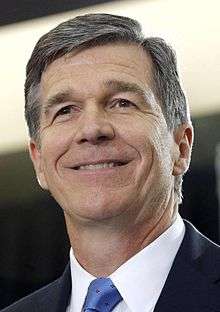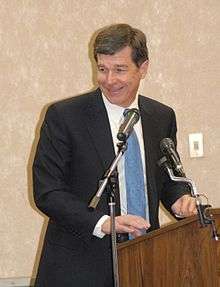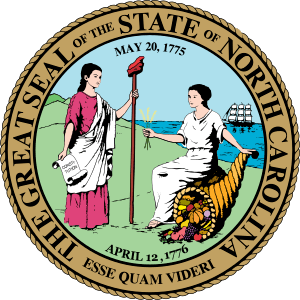Roy Cooper
| His Excellency Roy Cooper | |
|---|---|
 | |
| 75th Governor of North Carolina | |
|
Assumed office January 1, 2017 | |
| Lieutenant | Dan Forest |
| Preceded by | Pat McCrory |
| 49th Attorney General of North Carolina | |
|
In office January 1, 2001 – January 1, 2017 | |
| Governor |
Mike Easley Bev Perdue Pat McCrory |
| Preceded by | Mike Easley |
| Succeeded by | Josh Stein |
| Member of the North Carolina Senate from the 10th district | |
|
In office February 21, 1991 – January 1, 2001 | |
| Preceded by | Jim Ezzell |
| Succeeded by | A. B. Swindell |
| Member of the North Carolina House of Representatives from the 72nd district | |
|
In office February 9, 1987 – February 21, 1991 | |
| Preceded by | Allen Barbee |
| Succeeded by | Edward L. McGee |
| Personal details | |
| Born |
Roy Asberry Cooper III June 13, 1957 Nashville, North Carolina, U.S. |
| Political party | Democratic |
| Spouse(s) | Kristin Bernhardt |
| Children | 3 |
| Residence | Executive Mansion |
| Education |
University of North Carolina, Chapel Hill (BA, JD) |
| Website | Government website |
Roy Asberry Cooper III (born June 13, 1957) is an American politician and attorney serving as the 75th and current Governor of North Carolina since 2017. Prior to his governorship, Cooper had served as the elected Attorney General of North Carolina from 2001. Before that, he served in the General Assembly in both the North Carolina House of Representatives and the North Carolina Senate. Cooper is a member of the Democratic Party.[1]
He narrowly defeated Republican incumbent Pat McCrory for the governorship in the 2016 election.[2] On December 5, McCrory conceded the election, making Cooper the first challenger since 1850 to defeat a sitting North Carolina Governor.[3] Cooper took office on January 1, 2017. The Republican-dominated legislature passed bills in a special session before he took office to reduce his power. The legislature has overridden several of his vetoes of legislation.
Early life and education
Cooper was born in Nash County, North Carolina, the son of Beverly Thorne Batchelor, a school teacher, and Roy Asberry Cooper Jr.[4][5] He was raised in a rural community and worked in tobacco fields during the summer as a teenager. He received the Morehead Scholarship at the University of North Carolina at Chapel Hill for his undergraduate studies. He was elected as the president of the university's Young Democrats.[6] He also earned a Juris Doctor degree from the University of North Carolina School of Law.
State legislature
After practicing law with his family's law firm for a number of years, Cooper was elected to the North Carolina House of Representatives in 1986. He was appointed to the North Carolina Senate in 1991 to fill a remaining term of a seat that was vacated. In 1997, he was elected as Democratic Majority Leader of the state Senate. He continued to practice law as the managing partner of the law firm Fields & Cooper in Rocky Mount and Nashville, North Carolina.
North Carolina Attorney General
Elections
Cooper was elected North Carolina Attorney General in November 2000 and took office on January 6, 2001; he was re-elected for a second four-year term in 2004. Cooper was mentioned as a possible Democratic candidate for North Carolina governor in 2008, but he decided to run for re-election as Attorney General instead.[7] He was easily re-elected, garnering more votes than any other statewide candidate in the 2008 Attorney general election.[8]
Both state and national Democrats attempted to recruit him to run against Republican US Senator Richard Burr in 2010, but he declined.[9] In 2012 politicians suggested him as a possible candidate for Governor of North Carolina after incumbent Governor Bev Perdue announced her retirement, but Cooper declined to run.[10] His political consultant announced in 2011 that Cooper would seek a fourth term in 2012.[11] He was unopposed in both the Democratic primary and the general election.[12] In the November 2012 elections, Cooper received 2,828,941 votes.
Tenure

In January 2007, when Durham District Attorney Mike Nifong asked to be recused from dealing with the Duke lacrosse case, Attorney General Cooper's office assumed responsibility for the case. On April 11, 2007, Cooper dismissed the case against the Duke lacrosse team players, declaring them "innocent" and victims of a "tragic rush to accuse".
Following a decision in 2010 by a three-judge panel to exonerate Gregor Taylor, who had served nearly seventeen years for the first-degree murder of Jaquetta Thomas, Cooper ordered an audit after it was learned that officials at the North Carolina State Bureau of Investigation forensic lab had withheld information. This suppression of evidence had contributed to Taylor's conviction for murder. The audit was released in 2010; it found that it had been common practice for two decades for a select group of agents within the State Bureau of Investigation to withhold information. In addition, they did not keep up with scientific standards and the latest tests. The two investigators, Chris Swecker and Micheal Fox, cited almost 230 cases that were tainted by these actions. Three persons convicted in such cases had been executed; 80 defendants convicted were still serving time in prison. A massive state effort was undertaken to follow up on their cases.
Cooper argued his first case before the United States Supreme Court, J. D. B. v. North Carolina, in 2011, a case related to Miranda rights in juvenile cases.[13][14] The Court ruled 5–4 against North Carolina.[15][16]
Governor of North Carolina
Elections
2016

.jpg)
Cooper ran for Governor of North Carolina in the 2016 election against incumbent Republican Pat McCrory.[2] The election was extremely close. After an extended legal battle, McCrory conceded the election to Cooper on December 5.[17]
Transition
Dismayed by Cooper's win, the Republican-controlled North Carolina General Assembly passed special legislation before he was inaugurated to reduce the power of the governor's office.[18] In what The New York Times described as a "surprise special session", Republican legislators moved to strip away Cooper's powers before he would assume the governorship on January 1, 2017.[19] Throughout the month of December, Cooper oversaw an attempt to repeal the controversial Public Facilities Privacy & Security Act (commonly known as "House Bill 2", "HB2", or simply, the "bathroom bill"). The repeal attempt failed as a deal between state Republican and Democratic lawmakers and Charlotte officials fell apart.
Tenure
After taking office, as of January 6, 2017, Cooper requested federal approval for Medicaid coverage expansion in North Carolina.[20] Effective January 15, however, a federal judge halted Cooper's request, an order that expired on January 29.[21][22]On May 9, 2017, President Donald Trump and his administration appointed Roy Cooper along with incumbent New Jersey Governor Chris Christie to a commission to help fight opioid addiction.[23]
After the Supreme Court of the United States declared North Carolina's legislative maps to be unconstitutional,[24] Cooper called for a special redistricting session on June 7, 2017.[25] However, the Republican Party-dominated House and Senate cancelled the session, calling it "unconstitutional".[26] On June 29, Cooper signed the STOP Act, an overhaul of the prescribing and dispensing regulations of opioids.[27]
On July 1, Cooper signed a bill to allow alcohol sales after 10 AM on Sundays, nicknamed the "Brunch Bill" [28] On July 11, Cooper signed "Britney's Law," which states a homicide is first-degree murder if the killing was committed with malice and the defendant has been convicted before of domestic violence or stalking of the victim. Cooper also signed two additional bills to allow domestic violence protective orders granted by a judge to fully go into effect even when they're under appeal and to expand the state's "revenge porn" law from cases involving former lovers to those involving strangers.[29] On July 12, Cooper signed a bill that would add lessons on what to do when pulled over by law enforcement to the state's driver's education curriculum. The bill passed both chambers unanimously.[30]
On July 26, 2017, Cooper signed a bill to mount cameras on school buses in order to reduce drivers who illegally pass stopped school buses.[31] On August 31, 2017, declared a state of emergency due to plummeting gas supply,[32] which was rescinded on September 18.[33]
Vetoes
Cooper's first veto as North Carolina Governor was of a bill that would make elections to the North Carolina Superior Court and to the District Court partisan again, after being conducted on a nonpartisan basis for many years.[34] The Republican-dominated state House voted to override the veto on March 22, 2017.[35] The state Senate followed suit on March 23, which resulted in the bill becoming law over the Governor's objections.[36]
Cooper vetoed a bill on April 21, 2017, to reduce the size of the North Carolina Court of Appeals by three judges.[37] The veto was overridden on April 26.[38] He also vetoed a bill on April 21, 2017, that would create a new state board of elections (and new county boards of elections) split evenly between the Republicans and the Democrats. It would replace the longstanding system that gave the party of the Governor of North Carolina a majority on the board.[37] Both houses of the legislature, which are Republican-dominated, voted to override the veto on April 24 and 25.[39]
Cooper also vetoed a bill that would limit the individuals' ability to sue hog farms.[40] This veto was also overridden by the legislature.[41][42] On June 27, Cooper vetoed the proposed state budget, which he had called 'Irresponsible' the day before.[43] In his veto message, Cooper cited the budget's income tax cuts and argued it "lacks structural integrity by failing to account for population growth, inflation and looming federal reductions, by using one-time revenue for recurring expenses, and by adopting a tax plan that will cause the state to fail to fund promised teacher salary increases in future years" and the proposed bill included "provisions that infringe upon the governor's ability to faithfully execute the laws, including the administration of this Act, as required by the Constitution, and violating the separation of powers." The Republican-majority legislature voted to override the budget veto the next day.[44]
In July 2017, Cooper vetoed a bill to authorize nonprofit organizations to operate "game nights," saying it would unintentionally create a new opportunity for the video poker industry.[45]
Personal life
.jpg)
Roy Cooper is married to Kristin Cooper (née Bernhardt), who worked as a guardian ad litem for foster children in Wake County.[46][47] The couple has three daughters—Hilary, Natalie, and Claire—who all graduated from the University of North Carolina at Chapel Hill.[48][49] They reside in the Executive Mansion. Cooper has taught Sunday school classes, serving as a deacon and elder.
Electoral history
| Party | Candidate | Votes | % | |
|---|---|---|---|---|
| Democratic | Roy Cooper | 1,446,793 | 51.21 | |
| Republican | Dan Boyce | 1,310,845 | 46.40 | |
| Reform | Margaret Palms | 67,536 | 2.39 | |
| Total votes | 2,825,174 | 100.00 | ||
| Party | Candidate | Votes | % | |
|---|---|---|---|---|
| Democratic | Roy Cooper (inc.) | 1,872,097 | 55.61 | |
| Republican | Joe Knott | 1,494,121 | 44.39 | |
| Total votes | 3,366,218 | 100.00 | ||
| Party | Candidate | Votes | % | |
|---|---|---|---|---|
| Democratic | Roy Cooper (inc.) | 2,538,178 | 61.10 | |
| Republican | Bob Crumley | 1,615,762 | 38.90 | |
| Total votes | 4,153,940 | 100.00 | ||
| Party | Candidate | Votes | % | |
|---|---|---|---|---|
| Democratic | Roy Cooper (inc.) | 2,828,941 | 100.00 | |
| Total votes | 2,828,941 | 100.00 | ||
| Party | Candidate | Votes | % | |
|---|---|---|---|---|
| Democratic | Roy Cooper | 710,658 | 68.70 | |
| Democratic | Ken Spaulding | 323,774 | 31.30 | |
| Total votes | 1,034,432 | 100.00 | ||
| Party | Candidate | Votes | % | ± | ||
|---|---|---|---|---|---|---|
| Democratic | Roy Cooper | 2,309,162 | 49.02 | +5.79% | ||
| Republican | Pat McCrory | 2,298,881 | 48.80 | -5.82% | ||
| Libertarian | Lon Cecil | 102,978 | 2.19 | +0.06% | ||
| Margin of victory | 10,281 | 0.22 | -7.92% | |||
| Turnout | 4,711,021 | 68.98 | +1.68% | |||
| Democratic gain from Republican | ||||||
References
- ↑ "Richard D. Hearney - Google Search". google.com. Retrieved November 10, 2014.
- 1 2 "Attorney General Announces Candidacy For Governor". Charlotte Observer. November 6, 2014. Retrieved November 7, 2014.
- ↑ Dalesio, Emery. "North Carolina Gov. McCrory Concedes He Lost Re-Election Bid". ABC News. Archived from the original on December 5, 2016.
- ↑
- ↑ "Roy Cooper's mother dies".
- ↑ Camp, Jon (October 12, 2015). "Attorney general primed to begin run for NC governor". ABC11 Raleigh-Durham.
- ↑ Andrea Weigl. "newsobserver.com: Cooper says he won't run for governor". Archived from the original on September 15, 2012. Retrieved June 22, 2008.
- ↑ "News & Observer: Roy Cooper, N.C.'s most popular Democrat". newsobserver.com. Archived from the original on January 4, 2015. Retrieved November 10, 2014.
- ↑ Charlotte Observer: AG Roy Cooper says no to Senate race
- ↑ WRAL. "Perdue will not seek re-election". WRAL.com. Retrieved November 10, 2014.
- ↑ "News & Observer: Holding may seek attorney general's office". newsobserver.com. Archived from the original on December 24, 2014. Retrieved November 10, 2014.
- ↑ "Daily Reflector". reflector.com. Retrieved November 10, 2014.
- ↑ "Supreme Court site". supremecourt.gov. Retrieved November 10, 2014.
- ↑ "News & Observer: Court questions N.C.'s position on Miranda warning". newsobserver.com. Archived from the original on December 25, 2014. Retrieved November 10, 2014.
- ↑ "News & Observer: High court rules against NC in juvenile Miranda rights". newsobserver.com. Archived from the original on December 25, 2014. Retrieved November 10, 2014.
- ↑ High Court: Age Must Be Considered In Legislation
- ↑ "North Carolina Gov. McCrory concedes he lost re-election bid". Fox News. December 5, 2016. Retrieved December 5, 2016.
- ↑ Fausset, Richard; Gabriel, Trip (December 15, 2016). "North Carolina's Partisan Rift Widens in Fight Over Governor's Powers". The New York Times. ISSN 0362-4331. Retrieved January 2, 2017.
- ↑ Gabriel, Trip (December 14, 2016). "North Carolina G.O.P. Moves to Curb Power of New Democratic Governor". The New York Times. ISSN 0362-4331. Retrieved January 2, 2017.
- ↑ "NC Gov. Cooper: Governor Cooper Tells Washington that North Carolina Will Seek to Expand Medicaid". governor.nc.gov. Retrieved January 7, 2017.
- ↑ Donovan, Evan. "Gov. Cooper's Medicaid expansion temporarily blocked". WLOS. Retrieved January 15, 2017.
- ↑ Cooper Loses Latest Round In Medicaid Expansion Case
- ↑ Andrew, Joseph. "White House names new members of opioid commission". statnews.com. Retrieved October 5, 2017.
- ↑ Supreme Court Rejects 2 N.C. Congressional Districts As Unconstitutional
- ↑ "Gov. Roy Cooper calls for a special session to redraw district voting maps".
- ↑ "NC House, Senate cancel Cooper's call for redistricting special session, calling it 'unconstitutional'".
- ↑ Gov. Cooper signs STOP Act to fight opioid epidemic
- ↑ Gov. Roy Cooper signs "brunch bill"
- ↑ Cooper bills against domestic violence into law
- ↑ [Cooper vetoes casino night bill, signs traffic stop legislation http://www.wral.com/cooper-vetoes-casino-night-bill-signs-traffic-stop-legislation/16815928/]
- ↑ [Cooper signs bill to mount cameras on school buses http://www.wral.com/cooper-to-sign-law-to-mount-cameras-on-school-buses/16839706/]
- ↑ North Carolina Gov. Roy Cooper declares State of Emergency over gas supply concerns
- ↑ North Carolina governor rescinds state of emergency
- ↑ Governor Cooper Signs Veto of House Bill 100
- ↑ WRAL.com: House votes to override Cooper veto of partisan judicial elections bill
- ↑ NC Policy Watch
- 1 2 Governor Cooper vetoes House Bill 239 and Senate Bill 68
- ↑ NC General Assembly: House Bill 239 / S.L. 2017-7
- ↑ WRAL.com: Lawmakers override Cooper again; combine elections, ethics oversight
- ↑ Cooper Vetoes Hog Farm Protection Bill
- ↑ House overrides Governor Roy Cooper’s veto on nuisance lawsuit caps. Senate comes next
- ↑ Legislature overrides Cooper veto on hog farm odor lawsuits
- ↑ Cooper vetoes budget – and hints at another lawsuit
- ↑ Lawmakers Override Cooper Budget Veto
- ↑ Bill Signings for July 12, 2017
- ↑ Kristin Cooper. "My dad Capt. Sam Bernhardt with the 7th Mobile Army Surgical Hospital, Cu Chi, Vietnam, '66-'67. When he was drafted, he closed his medical practice & left his wife & 4 young children to serve his country. Thanks to every veteran for your service & sacrifice. -KC #VeteransDay". Twitter.
- ↑ {cite web|url=http://www.rockymounttelegram.com/News/2018/08/07/Service-project-seeks-to-aid-foster-children.html%7Ctitle=Service project aids foster kids|last=Davis|first=Corey|date=August 7, 2018|work=Rocky Mount Telegram|accessdate=August 17, 2018}}
- ↑ {{cite web|url=https://www.sms.edu/about-us/school-news/~post/nc-first-lady-kristin-cooper-will-be-2017-commencement-speaker-20170223%7Ctitle=N.C. First Lady Kristin Cooper will be 2017 commencement speaker|publisher=Saint Mary's School|accessdate=August 17, 2018}
- ↑ Colvard, Bill (June 9, 2018). "Franklin grads, NC first lady reconnect". The Mt. Airy News. Retrieved August 17, 2018.
External links
- NC Governor Roy Cooper (Official government site)
- Roy Cooper for Governor (Official campaign site)
- Roy Cooper at Curlie (based on DMOZ)
- Appearances on C-SPAN
| Party political offices | ||
|---|---|---|
| Preceded by Mike Easley |
Democratic nominee for Attorney General of North Carolina 2000, 2004, 2008, 2012 |
Succeeded by Josh Stein |
| Preceded by Walter Dalton |
Democratic nominee for Governor of North Carolina 2016 |
Most recent |
| Legal offices | ||
| Preceded by Mike Easley |
Attorney General of North Carolina 2001–2017 |
Succeeded by Josh Stein |
| Political offices | ||
| Preceded by Pat McCrory |
Governor of North Carolina 2017–present |
Incumbent |
| Current U.S. order of precedence (ceremonial) | ||
| Preceded by Mike Pence as Vice President |
Order of Precedence of the United States Within North Carolina |
Succeeded by Mayor of city in which event is held |
| Succeeded by Otherwise Paul Ryan as Speaker of the U.S. House of Representatives | ||
| Preceded by Andrew Cuomo as Governor of New York |
Order of Precedence of the United States Outside North Carolina |
Succeeded by Gina Raimondo as Governor of Rhode Island |
